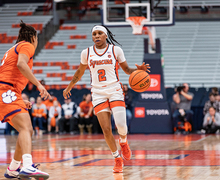Unplugged: How Syracuse athletes handle their tech addiction
Alexandra Moreo | Senior Staff Photographer
Multiple Syracuse athletes are working to spend less time on their phones.
A new sign in Manley Field House, fixed on a filing cabinet inside the weight room area, reads: “Don’t post about it, be about it.”
The 8.5-by-11-inch sign functions as a continual reminder for Syracuse athletes to worry less about maintaining their Instagram, Twitter and Snapchat accounts. They’ve become downtime fillers in the locker room and while teams travel. But they’ve also become distractions.
A growing number of collegiate programs have instilled phone rules, written or unwritten. Syracuse Athletics is no outlier. From men’s basketball to softball to field hockey, SU athletes must abide by a number of restrictions, based on their team’s discretion, that dictate when they can and can’t scroll through their phone. Knowing when to unplug presents a challenge.
“Phones are getting a bad rap,” Syracuse men’s basketball assistant coach Allen Griffin said. “Some guys can watch film on themselves. It’s a powerful tool. But checking your phone for your girlfriend’s text messages 20 minutes before a game? That’s not good.”
The near-universal access to digital technology — tablets, phones and laptops — is transforming modern society, including athletics. Technology can unite teams through group texts and film-study accounts like Hudl, although it can have negative effects on physical and mental health. Most adults spend 10 hours a day or more consuming electronic media, according to the Nielsen Total Audience Report.
Jarrod Spencer, a sports psychologist who has met with SU athletes from every team, highlights the risk of smartphone addiction whenever he lectures in Manley Field House. Last fall, he told athletes that constant phone usage can hurt athletes’ abilities to stay focused on the field. Spencer said players should limit themselves to an hour or two of screen time.
“The phones,” Spencer said, “can be a killer.”

Alexandra Moreo | Senior Staff Photographer
After SU men’s basketball games, most players stand near their respective lockers in similar positions: eyes lowered, bent over staring at their devices. After losses, they players quietly scroll their phones and avoid conversation, making the Do Not Disturb setting a team favorite.
Before practice, freshman forward Buddy Boeheim said he turns his phone off or sets his phone to Do Not Disturb. “We’re trying to get off our phones,” Buddy said. “We can’t be distracted.”
Jim Boeheim, the Hall of Fame SU head coach of 43 seasons, doesn’t have any hard-and-fast smartphone rules for his team. He’s a fledgling texter. His phone rules are implied: No phones during the game or at halftime. No phones during team meetings. No phones when he’s talking.
There’s no singular smartphone policy at Syracuse, according to more than a dozen SU athletes across several sports. But some athletes sense a gentle push away from phones, with field hockey perhaps at the greatest extreme. Head coach Ange Bradley maintains a strict no-phone rule anywhere near the field, during parts of road trips, at team meals and during any team function.
Other teams are less concerned about phones, as long as athletes are respectful. But some former players took their own initiative to cut down their screen time at SU. Former SU forward Tyler Lydon deleted his Snapchat account and stayed off Twitter during his sophomore year before he was drafted by the NBA. And Syracuse softball’s all-time hits leader, Sammy Fernandez, decided to leave her charger at home. Her logic: If she doesn’t use her phone much, she won’t need to charge it.

Anna Henderson | Digital Design Editor
Some current players, such as freshman midfielder Ryan Raposo, set a few personal restrictions: Raposo doesn’t go on his phone an hour before bed and he leaves his phone in his bag during class.
Last spring, Raposo’s teammate, Syracuse goalkeeper Hendrik Hilpert, was thinking about how he spent his time. He realized there was something he didn’t like, so he deleted his Facebook account. The hours were adding up, and he repeatedly caught himself filling gaps of time by scrolling through his news feed. Ten minutes would go by and he’d ask himself, “What have I just done?”
As women’s soccer midfielder Georgia Allen scanned a full bus of students and athletes, all on their phones, it hit her. “Everyone was on their phone,” she recalled. “It drives me crazy.” Allen changed her phone tendencies, but results around SU Athletics haven’t followed yet. Athletes still love their phones, even if they know their harm.
“The obsession over phones can damage team environments,” Allen said. “We go into team meetings and people are on their phones. We need to remind one another: no phones. Every minute counts.”
Published on January 17, 2019 at 12:23 am
Contact Matthew: [email protected] | @MatthewGut21





